2018-2019年英语外研版小学四年级上册Unit 1 There is a horse in thi
2018-2019年英语外研版小学四年级上册Unit 1 Do you want some rice优质课教案
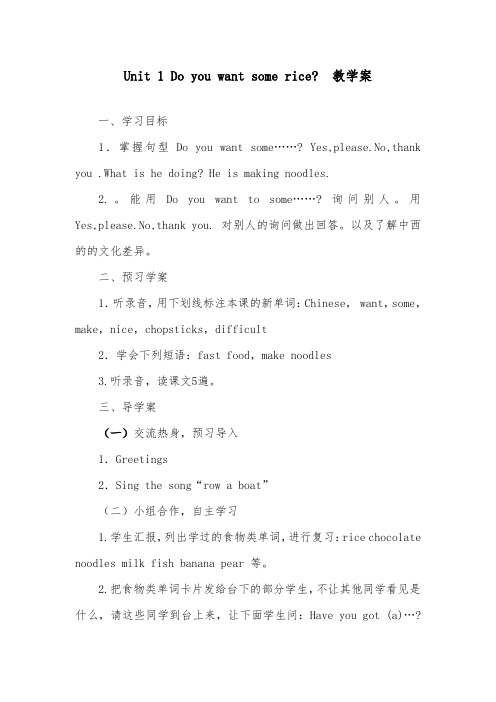
Unit 1 Do you want some rice? 教学案一、学习目标1.掌握句型Do you want some……? Yes,please.No,thank you .What is he doing? He is making noodles.2.。
能用Do you want to some……? 询问别人。
用Yes,please.No,thank you. 对别人的询问做出回答。
以及了解中西的的文化差异。
二、预习学案1.听录音,用下划线标注本课的新单词:Chinese, want,some,make,nice,chopsticks,difficult2.学会下列短语:fast food,make noodles3.听录音,读课文5遍。
三、导学案(一)交流热身,预习导入1.Greetings2.Sing the song“row a boat”(二)小组合作,自主学习1.学生汇报,列出学过的食物类单词,进行复习:rice chocolate noodles milk fish banana pear 等。
2.把食物类单词卡片发给台下的部分学生,不让其他同学看见是什么,请这些同学到台上来,让下面学生问:Have you got (a)…?持卡片的同学根据实际情况回答Yes,I have./No,I haven’t.小组之间展开比赛,看哪个小组猜中的最多。
3.小组活动,用自己做好的食物单词卡片,运用所学句型进行问答练习,如果对方的回答是Yes,please.,就得把自己制作的这张卡片送给他。
(三)归纳探究,词汇点拨1.出示做拉面图片,问:What is he doing ?引导学生回答:He’s making noodles。
(短语教读),接着问学生:Do you want some noodles ?发给举手的同学一人一个碗,一双筷子chopsticks(单词教读),吃完面后大家一起说:It’s nice.but… Chopsticks are difficult.(单词教读)2.师:今天是我们班上…的生日,他将会办一场生日派对,到时候他会要求所有的同学去到他家里,他准备了很多好吃的中国快餐,幻灯片出示“Chinese food”教读,老师化身为派对的小小服务员。
小学四年级英语【外研版】上册教学课件-【Module 1 Unit 1】
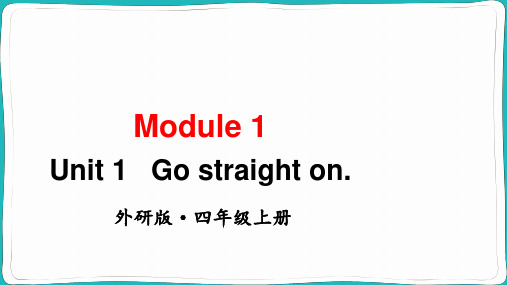
A: Excuse me. Where’s the supermarket, please? B: Go straight on the rode, then turn right.
A: Excuse me. Where’s the school, please? B: Turn right, then go straight on the rode.
在……旁边,在……附近
Pay attention to following the traffic rules, or you will be lost.
迷路的
Word game
straight
right left cinema
supermarket
live beside No. street
What’s the game? Hide-and-seek(捉迷藏).
居住 I live in a small house.
Where do you live?
I live at No. 2 Park Street.
大街,街道 (number的缩写) 第……号
What can you see?
电影院
超市
Where is the cinema? It’s beside the supermarket.
I’m on your
I’m behind
left.
左边
the tree.
Where are you now?
Where are I’m on your you, Tom? righre are you, Tom? where是特殊疑问词,用来询问地点,常用 来问某人或某物在什么地方,其句型是“Where + be +主语?”,其答语用表示地点的介词短语 或指路用语回答。
四上英语 《There is a horse in this photo》教学课件
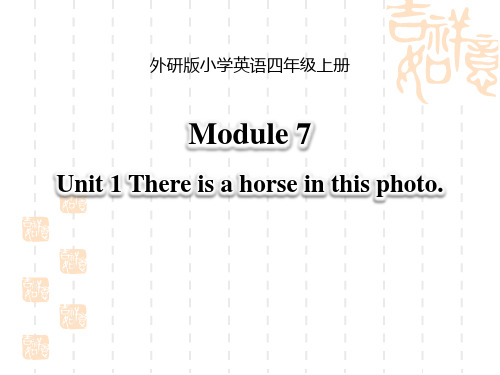
Let’s learn.
horse 马 There is a horse in the photo. there is 有,存在
Let’s learn.
sheep 羊,绵羊
sheep单复数形式相同
The sheep is eating vegetables.
vegetable 蔬菜
Let’s learn.
Role play
以小组为单位练习对话,并表演。 1. Read the dialogue. 合作朗读。 2. Role play the dialogue. (含有表情、语气、动作表演对话。)
Fill in the balnks
根据短文内容填空。 1. In the picture, the horse is _r_u_n_n_i_n_g_f_a_s_t_. 2. The cat is _c_l_im__b_in__g_t_h_e_t_r_e_e_. 3. The sheep is _ea_t_i_n_g_v_e_g_e_t_a_b_le_s_. 4. Lingling is _ri_d_i_n_g_a__h_o_r_s_e.
1. How many photos are there? T__h_e_r_e_a_r_e_f_o_u_r_. __
2. Do you see a cat? _Y__es_,_I_d__o_. ________
3. Who is riding a horse? _L_i_n_g_l_in_g__is__r_id_i_n_g_a__h_o_r_s_e_. _
Write and say
There is _a_m__o_n_k_ey__ in the photo. It is _c_l_im__bi_n_g_t_h_e_t_re_e__.
外研社一起点小学英语四年级上册课文全文
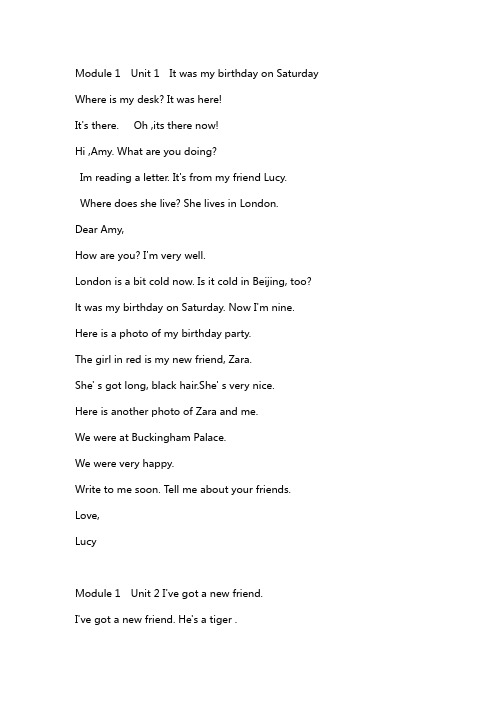
Module 1 Unit 1 It was my birthday on Saturday Where is my desk? It was here!It's there. Oh ,its there now!Hi ,Amy. What are you doing?Im reading a letter. It's from my friend Lucy. Where does she live? She lives in London.Dear Amy,How are you? I'm very well.London is a bit cold now. Is it cold in Beijing, too? lt was my birthday on Saturday. Now I'm nine. Here is a photo of my birthday party.The girl in red is my new friend, Zara.She' s got long, black hair.She' s very nice.Here is another photo of Zara and me.We were at Buckingham Palace.We were very happy.Write to me soon. Tell me about your friends. Love,LucyModule 1 Unit 2 I've got a new friend.I've got a new friend. He's a tiger .He's got short, yellow hair.Dear Lucy,Thank you for your letter.Happy birthday to you!I'm ten now.I will be eleven next year.Beijing isn't cold now.It's warm.I've got a new friend, too.Her name is Mengmeng. She's got short hair.She's very clever.Here is a photo of Mengmeng and me .We were at the Great Wall.Love ,AmyModule 2 Unit 1 I helped my mum.Hooray,hooray,I washed my shirt!Hooray,hooray,I washed my skirt!Yesterday,I cleaned my room.I finished my homework.My trousers were very dirty.I washed them.Then I helped my mum .She was very happy.You are a very good boy,Daming!Thank you,Mum.Module 2 Unit 2 Amy painted a picture.Last Sunday ,I cooked noodles.He cooked noodles,too.Yesterday,Mr Smart cooked noodles.Tom helped him.Ms Smart phoned Grandma.Sam watched TV.Amy painted a picture.Module 3 Unit1 she didn't walk to school yesterday.I finished my homework.You didn't finish your homework.Lingling usually gets up at 7 on Mondays.But she didn't get up at 7 yesterday.She usually walks to school .But she didn't walk to school yeaterday.She usually has English at school.But she didn't have it yesterday.Yesterday was National Day!Lingling watched TV and played with her toys.Module 3 Unit 2 I didn't play football. Yesterday I cooked fish.But I didn't eat it.On Sundays.I usually ride my bike to the park. And I usually play football in the park.But I didn't ride my bike yesterday.And I didn't play football in the park.It was raining .I stayed at home and cleaned all the rooms. What a boring day!Module 4 Unit 1 Chinese people invented paper. What's this?It's a boat .And it's a bike .too!I invented it.Wow ,you are so clever.Chinese people invented many important things. Chinese people are very clever.Yes.Chinese people invented paper.Chinese people invented printing,too.We print books and newspapers.That's rightI printed our class newspaper yeaterday. Oh ,where is it ?Look ,it's between the chairs.Module 4 Unit 2 He invented this bicycle. Look at the mouse .It's beside the house.Oh ,no! It's in front of the cat.Look at the man beside the bicycle.He invented this bicycle.He was from the UK.Look at the man between the two cars.He invented these cars.He was from the US.Module 5 Unit 1 We went to the Great Wall.I went to the river,and saw your sister.I went to the party,and saw a monkey.Did you go on a school trip yesterday? Yes.We went to the Great Wall.It took us fifty minutes to climb to the top. And we saw lots of mountains.We ate candies.And we saw some beautiful plants. So,you had a good time.Yes.And we bought you a present.It's a picture of the Great Wall.Thank you,boys.Module 5 Unit 2 I wore warm clothes.I saw the pig yesterday.He went skating.A pig went skating! Haha......Dear Amy,Yeaterday ,we went on a school trip. We went skating .I wore warm clothes. The ice was very cold.At first,I fell over.But it didn't hurt a lot.Then I was able to skate.It was easy! And I didn't fall over again. It was really fun!Love,LucyModule 6 Unit 1 It didn't become gold.I had noodles for breakfast yesterday.You had fish for breakfast yesterday.No, I didn't have fish for breakfast.I had fish for dinner.Long, long ago,there was a good boy.His name was Ma Liang.He helped people.He had a magic paintbrush.This old woman didn't have food.So Ma Liang painted food.Then the food became real.There was a bad man.He took Ma Liang's magic paintbrush.The bad man didn't have gold.So he painted gold with the magic paintbrush. But it didn't become gold.It become a snake!Module 6 Unit 2 He didn't come back.Amy went to the park yesterday.She didn't take the flowers away.She didn't take the leaves away.She only took her painting away.The bad man was angry.The magic paintbrush didn't help him.It only helped Ma Liang.He took Ma Liang away."I want a big ship," said the bad man. "You paint it!"So Ma Liang painted a ship.Then the ship became real.The bad man went to sea in the ship. But he didn't come back.Module 7 Unit 1 Did you take Amy's doll? What's the matter, Mum?I lost my hat.Did you see it?It's on your head!Ha ha...What's the matter, Amy?I lost my favourite doll.I can't find it.Sam, did you take Amy's doll?No, I didn't.Lingling, did you see Amy's doll? No, I didn't.Tom, did you take Amy's doll? No, I didn't.Oh, I can't find it.Who's crying?My Baby doll! Where is it? Stand up, Daming.You found Amy's doll.Did I?Yes, you did! Thank you.Module 7 Unit 2 Did you see it? Did you take my milk?No, I didn't.Bob, you took my milk away! Hello, Mum. What's the matter?I lost my key.Did you see it? No, I didn't.Did you look for it in your bag? Yes, I did. It isn't there.Oh, Bob took it away.Oh, Bob. Come back!Module 8 Unit 1 When did they come? Yesterday, what did you do?Yesterday, I went to the zoo.At the zoo, what did you see?I saw a pig under the tree.Look, Amy.Some English children came to China last week. Did they come for the music competition? Yes, they did.When did they come?They came last Wednesday.Look, this girl won the gold cup.What did she play?She played the flute.I can play the flute, too!So practise more.Then you will win a competition, too.Module 8 Unit 2 Where did you go yesterday? Where did you go last Sunday?I went to the zoo.Oh, I know.I took a picture of you.Amy, you look tired.Where did you go yesterday?I didn't go out.I stayed at home.What did you do?I played the flute.I practised a lot.Don't play too late!Module 9 Unit 1 What happened to your head? What happened?I fell off the tree.What did you do in the tree? I...What happened to your head, Daming?Oh, Sam and I went for a bike ride yesterday.And then...?And then we were hungry and thirsty. Did you buy some water?No, we bought a watermelon.Sam carried the watermelon on the bike.Did you fall off your bike?No, Sam fell off his bike.And I bumped my head.Then he took me and the watermelon to the hospital.Ha ha...Module 9 Unit 2 I bumped my head."Don't jump on the bed,"My father and mother said. But I jumped and jumped on the bed.Then I fell off the bed and bumped my head.What happened to you?I bumped my head.I fell over. I hurt my knees.I cut my finger.Module 10 Unit1 Go to bed early.I get up very early every morning.I get up very late. I sleep during the day.At the Doctor'sSam Smart. Come in, please!What's the matter?I've got a cold.What did you do yesterday?I played computer games. I went to bed late.Take this medicine. Drink a lot of water.Go to bed early. And do some exercise.Unit 2 Eat vegetables every day.Fruit is good for us.Vegetables are good for us.You naughty pig!Salad is good for us.Do you want to be healthy?Eat vegetables every day.Eat some fruit, too.Drink lots of water or juice.Do exercise every day.You can walk, run, swim or play ball games.Always wash your hands before you eat and after you go to the toilet.。
2018-2019年英语外研版小学四年级上册Module 1 Unit 1优质课教案
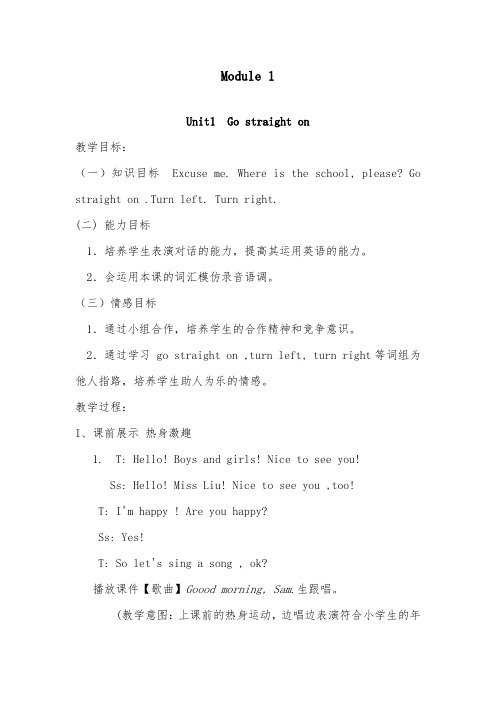
Module 1Unit1 Go straight on教学目标:(一)知识目标 Excuse me. Where is the school, please? Go straight on .Turn left. Turn right.(二) 能力目标1.培养学生表演对话的能力,提高其运用英语的能力。
2.会运用本课的词汇模仿录音语调。
(三)情感目标1.通过小组合作,培养学生的合作精神和竞争意识。
2.通过学习 go straight on ,turn left, turn right等词组为他人指路,培养学生助人为乐的情感。
教学过程:I、课前展示热身激趣1. T: Hello! Boys and girls! Nice to see you!Ss: Hello! Miss Liu! Nice to see you ,too!T: I'm happy ! Are you happy?Ss: Yes!T: So let's sing a song , ok?播放课件【歌曲】Goood morning, Sam.生跟唱。
(教学意图:上课前的热身运动,边唱边表演符合小学生的年龄特点,吸引了学生的注意力,稳定了学生的情趣,也活跃了课堂气氛。
)2. Listen to the tape and repeat the dialogue in activity 1. 播放【录音】,生听录音跟读。
(听录音,模仿录音的语音语调朗读对话,提高学生的朗读水平。
) II、导入新课,呈现任务Part 1. Learn the new words and phrases.1. T: Sam wants to go to Daming's home , but he is lost , let' s have a look .【播放课件】2. T: There are some places in the classroom . Can you show me where's the school \ park \zoo \KFC \ supermarket? (事先把几幅相应的图片贴在教室的各个角落)The Ss point them out.T: Is the school on my left ? (学生听不懂,用中文翻译一遍)(教学意图:以情境引入教学,并使用多媒体课件辅助,更易使学生快速进入学习意境,以听指的方法来复习学过的单词,既巩固了旧知,又自然地引出了新知:left / right )3. Teaching the two words : left / right(出示单词卡片)4. Practicing the two new words:A.Guessing where's the sweet .(猜对的学生,把那个糖果给他)B. 踏步练习:left, right,(分组练习)T: Let 's do some exercises and we're going to have a competition. The group which does better will get 10 points.5. 指定一名学生上来再做一组练习后,发出新指令:Turn left ! (学生没有反应,不明白什么意思,教师用肢体语言表示其意)6.出示卡片:Turn 师带读7. 贴出标志图: Turn left Turn right8 . Competition.规则:每组选一名同学上台,听教师指令,做左转、右转,做错的同学淘汰下去,最后一名站在台上的同学就是胜利者,可为自己小组加10分。
外研版英语四年级上册第一单元全部课件精选全文

Go straight on! It’s beside the supermarket.
Where are you? I’m on your left now.
Find friends.
turn left
turn right
Where will the boy go?
School
Park
Supermarket
Go straight on and turn left. It's beside the lake.
Cinema
Cinema
Lake
School
Where will the boy go?
Park
Supermarket
Supermarket Zoo
School
Pair work.
最佳交警
小组合作,首先准备一幅简单的交通标示图,大
家轮流扮演交警,其他成员用Excuse me. Where’s
the..., please? 询问位置。
有趣的路标 小偷路标 这种路标恐怕是最受欢迎的标志。在美 国、丹麦、加拿大等国有一种奇怪的路标,它上面画着一 个身背赃物、手拿百宝箱钥匙的小偷图案,这是在警告司 机这一路段不太平,要注意防止盗窃和遭遇抢劫。 青蛙路标 德国一些公路上,时常会出现成群结队 的青蛙过马路的情况,德国政府为了保护青蛙,特意在这 样的公路旁竖起若干块上面绘有巨型青蛙的路标。
go straight on
根据指令做动作
turn right turn left
turn right go straight on
go straight on
四年级上册英语第一模块的单词外研

四年级上册英语第一模块的单词外研全文共3篇示例,供读者参考篇1Unit 1 Vocabulary - A World to ExploreWow, we just started our new English textbook and there are so many cool new words to learn! I'm really excited because learning new vocabulary always feels like unlocking little doors that allow me to understand more of the world around me. Let me share with you some of the awesome words we've been studying in Unit 1.One of the first words we learned was "adventure". My teacher told us it means an exciting experience or undertaking. I love having little adventures, like exploring the woods behind my house or trying a new food I've never tasted before. Everything feels like more of an adventure when you're a kid!We also learned "climb", which is what you do when you use your hands and feet to go upwards, like climbing a tree or a rock wall. My favorite thing to climb is our neighborhood jungle gym – I can scramble all the way up to the very top!Then there's "wave", which can be a noun or a verb. As a noun, it refers to those rolling swells of water in the ocean or a lake. But as a verb, it means to move your hand back and forth to greet someone. I always wave really enthusiastically to my parents when they come to pick me up from school."Treasure" is another cool word that makes me think of pirates and their loot of gold and jewels. But the teacher said a treasure can be anything valuable or precious, even just a cherished memory. I think of my old teddy bear as my own little stuffed treasure.We learned that a "path" is a trail or way, often one that winds through nature. There's a nice little path that cuts through the woods near my house and I love wandering along it, watching for squirrels and birds."Whisper" is both a noun and verb meaning to speak very softly and quietly, using hushed tones. My friends and I whisper to each other a lot during class when we're not supposed to be talking!"meadow" refers to a grassy, open area of land, like a peaceful clearing in the woods or mountains. The big park near my house has some wide meadows where I can run around and play catch.I thought "steep" was a fun word. It means sloping sharply upwards at a very intense angle. The hill in my backyard is pretty steep and I have to be careful when I go sledding down it in the winter."summit" is the very top or highest point, like the summit of a mountain peak overlooking everything below. Just envisioning standing on a big mountain's summit makes me feel tiny but also free and powerful at the same time."ridge" refers to a long raised line on a surface, like the ridges on the roof of my house or on my fingers and palms. I remember learning about tectonic ridges under the ocean too, where new crust is formed.Those are just some of the awesome vocabulary gems we've mined so far in Unit 1. I can't wait to keep on discovering more fun and enlightening new words as we work our way through the rest of the book. Building up my vocabulary makes me feel like a brave explorer setting off on grand adventures into the wide, wide world!篇2The First Module's Vocab WordsHey there! It's me, a fourth grader just starting out the brand new English textbook. Module 1 has quite a few new vocabulary words that I need to master. I'm going to go through them one by one and share what I know so far. Here goes!The first word is "season." This refers to one of the four periods of the year - spring, summer, fall, and winter. Each season has its own typical weather patterns. For example, winter is cold and snowy, while summer is hot. Understanding the seasons is important for talking about things like holidays, clothes, and activities.Another key word is "weather." This describes what's going on outside with things like temperature, precipitation, wind, etc. Is it sunny, rainy, cloudy, or snowy? Knowing weather words helps me discuss my plans and whether certain outdoor activities are possible.I also learned "temperature." This scientific term refers to how hot or cold it is outside, measured in units like degrees Celsius or Fahrenheit. Temperatures above 20°C are generally conside red warm, while below 10°C is quite chilly. Discussing the temperature forecast is handy for travel or dressing appropriately.A word related to temperature is "thermometer" - the instrument used to measure it. There are different types like oral, rectal, or outdoor thermometers. Having the right thermometer ensures you get an accurate reading.One of the toughest words was "meteorologist." This is a person who studies and predicts the weather through observing atmospheric conditions. Their forecasts on TV or online help people plan their days and stay safe during storms.The word "cloud" was pretty easy - those white, fluffy things drifting across the sky. I learned different cloud types like cirrus (wispy), cumulus (puffy), and cumulonimbus (the big, dark storm clouds). Recognizing cloud formations helps predict incoming weather changes."Fog" was another straightforward term - that thick, grey mist that makes it hard to see very far in front of you. This often happens on cool mornings near lakes or oceans. You have to take extra care when driving in foggy conditions.The vocabulary word "wind" refers to air moving from an area of high pressure to low pressure. Winds can range from a gentle breeze to powerful gales that can knock things over. Certain wind names also indicate strength, like "gust" being a short burst.I thought "lightning" and "thunder" went together nicely. Lightning is the bright flashes you see streaking across the sky during a thunderstorm, while thunder is the loud booming sound caused by rapidly expanding air along the lightning bolt's path.The word "forecast" kept popping up - it means a prediction of what weather conditions will be over a certain upcoming period. This vital information comes from meteorologists analyzing all the latest data."Precipitation" was an advanced term covering all forms of liquid or frozen water particles falling from clouds, like rain, sleet, hail, or snow. Light mists are classified as different types of precipitation too.I enjoyed learning "rainbow" - that stunning arc of seven colors (red, orange, yellow, green, blue, indigo, violet) produced by sunlight refracting through water droplets in the atmosphere after rain. What a beautiful natural phenomenon!One confusing pair was "weather" versus "climate." Weather refers to atmospheric conditions over a short period of time in a small area, while climate describes prevailing weather patterns averaged over a long period across a large region.Words related to climate included "drought" (a prolonged period of abnormally low rainfall), "humid" (air with high moisture content), and "arid" (a very dry climate like a desert).Another tricky one was "meteorology" - the scientific study of the atmosphere and its phenomena, including weather processes and forecasting. This field combines chemistry, physics, mathematics, and more.That covers the main weather and climate vocabulary for this first module! I think understanding these terms will really help improve my skills in discussing and describing different atmospheric conditions. Stay tuned for more word lists to come!篇3Wow, can you believe we're already in fourth grade? It felt like just yesterday we were learning the alphabet and numbers in first grade. Now we're expected to learn all these new English vocabulary words from Unit 1. I have to admit, some of them are pretty tricky!Let's start with the category of "Stationery." We have words like "pencil," "eraser," "ruler," "crayon," and "marker." Those seem pretty straightforward. I always get a kick out of the word "sharpener" though. It reminds me of the little plastic sharpenerswe all have on our desks that get dull pencils nice and pointy again.Then we have the "School Supplies" list with "schoolbag," "lunchbox," "notebook," "textbook," and "dictionary." My schoolbag is starting to get kind of worn out—maybe I can convince my parents to buy me a new one soon! And my lunchbox has definitely seen better days with all the stains and dents in it. Time for an upgrade there too!The "Classroom Objects" category has some good ones: "desk," "chair," "blackboard," "chalk," and "duster." Raise your hand if you've ever tried to draw on the chalkboard when the teacher wasn't looking! Just me? Okay, maybe I shouldn't admit to that...When it comes to "Stationery Actions," we're learning words like "write," "draw," "color," "read," and "paint." I'm definitely a better reader than painter, but I do love coloring intricate designs. There's something really relaxing about it.Under "School Subjects" we have the obvious ones like "math," "science," "English," "art," and "P.E." I'd say my strongest subjects are English and art, butP.E. is definitely a struggle for me. Nothing like running laps to make you feel out of shape!For the "People" section, we're learning "student," "pupil," "teacher," "principal," and "librarian." You know what they say—the students are the most important people in a school! We better not forget that.The "School Places" list has "classroom," "playground," "canteen," "library," and "lobby." The library is probably my favorite place in school. There's just something magical about being surrounded by endless books.Lastly, the "School Activities" words are "learn," "study," "take a test," "raise your hand," and "go on a field trip." Tests are definitely the worst part of being a student. But field trips? Sign me up! Any excuse to get out of the classroom for a day.Phew, that's a lot of new vocabulary to take in for one unit! I have a feeling these words are just the tip of the iceberg for what we'll be expected to learn this year. Still, I'm pretty excited to continue improving my English skills.After all, English is considered one of the most important languages in the world for business, travel, and accessing information. The more vocabulary I can master now, the better prepared I'll be for the future. Who knows, maybe I'll even become an English teacher myself one day!For now though, I better get back to studying these Unit 1 words. Maybe some flashcards or matching games will help them really stick in my brain. I'll never take English fluency for granted again after see how much work goes into building a solid vocabulary foundation. Wish me luck!。
新外研版小学英语四年级上册精品课件Unit1 There is a horse in this photo授课课件

A:There are some nice photos here. B:Let‘s have a look. B:There is a horse in this photo. A:It's running fast. B:There is a sheep in this photo. A:It's eating vegetables. A:There is a cat. It's climbing a tree.
习题来自《 》
四、将下列字母按正确顺序排列,组成新单词,并写出汉 语意思。 ( 1 ) o,r,h,e,s( horse 马 ) ( 2 ) v,g,e,t,e,b,a,l, e( vegetable蔬菜 ) ( 3 ) e,c,a,f( face脸 )
本节课我们学习了以下知识,请同学们
一定加强巩固,以便能和同学们进行灵活交 流重点哦词!汇:horse, sheep, vegetable
Look at the photo. There is a horse. And there is a girl. She is riding the horse.
讲解来自《 》
知识点 1 horse /hɔːs/ n. (名词) 马[四会] 例句:He likes the horse. 他喜欢这匹马。 发音:字母组合or 在horse 中发/ɔː/。 短语:ride the horse 骑马
讲解来自《 》
知识点 5 vegetable /'vedʒtəbl/ n. (名词) 蔬菜 例句:I like vegetables. 我喜欢蔬菜。 短语:green vegetables 绿色蔬菜
加法记忆法:vege + table(桌子)= vegeta
- 1、下载文档前请自行甄别文档内容的完整性,平台不提供额外的编辑、内容补充、找答案等附加服务。
- 2、"仅部分预览"的文档,不可在线预览部分如存在完整性等问题,可反馈申请退款(可完整预览的文档不适用该条件!)。
- 3、如文档侵犯您的权益,请联系客服反馈,我们会尽快为您处理(人工客服工作时间:9:00-18:30)。
Module 7
Unit1 There is a horse in this photo.
一、教学目标:
(一)知识目标:
1.听懂、会说、会读词汇:there ,horse, sheep, have a look,
2.能灵活运用重点句型: There is ... in the photo. He/She is…
3.让学生初步了解西方万圣节的习俗
(二)能力目标:
能够听、说、认读单词,能够用本课所学用语和他人交流。
(三)情感目标:
培养学生学习英语的兴趣,激励学生积极参与活动,积极与他人合作。
二、教学过程:
(一)课前展示热身激趣:
Warm-up and lead-in.
1.Greeting in pairs.
T hen say the chant : “Can I have some soup?”
学生边打拍子边说韵句。
(二)导入新课,呈现任务:
Leading-in
1.Show pictures: playing basketball, running, shipping, and
so on.Let’s do asking and answering like this: W hat is he/she doing? He is…(激活知识)
2.Show the picture of the text .(Amy is riding a horse) get
Ss look at the picture and ask :What can you see?(Help Ss answer.)
3.Watch and listen to the CD-ROM.(整体感知如何描述图画)
4.Watch ,listen and reapeat.(学着说,并提醒学生注意模仿语音
语调,感知今天要学的内容There is …的语用,为新课学习做铺垫)
Learn:horse 注意与house的区别,用图片进行比较。
句型学习:出示图片,学生看图并用句型There is a cat. There is a dog. There is a girl. It’s playing. It’s eating.来描述。
向班级推荐手抄报的图片,并用There is ... in the photo. He/She is…描述自己推荐的图片。
课文学习text learning:
Play the CD-ROM. Get Ss watch and listen and thinking :
师问:What are Sam and Amy talking about?
1.Ss try to answer the question.(1,2整体感知课文)They are talking about photos.
2.Sam, Amy, Daming are talking about photos. How are they talking about them? Listen again and repeat.(进一步感知课文)
3.Show questions, listen and try to answer the questions(带问题听录音,试着回答,进一步了解课文内容,为学习目标语句打基础) Questions: What’s in photo 1?
What’s in photo 2?
What’s in photo 3?
引导学生回答每个问题后连起来描述:There are talking about photos. There is …in photo 1…(板书There is a horse in this photo. There is a sheep in this photo.…)
1.Try to say:There is a…
2.Listen and repeat.
3.Work in group: Retell the text.(A group of four把打乱顺序的课文句子重新排列好,强化对课文内容的理解)
(三)课堂活动操练新知:
Listen and say(P40 Activty 3) 跟读模仿语音语调。
四人小组用T here is…. She’s….描述图片内容,共同完成任务。
给学生三分钟练习,然后以小组为单位向全班展示。
奖励表现好的学生。
(四)巩固练习拓展提高:
Finish Ex 1,3,4(课堂活动用书),巩固所学知识。
检查答案
(五)反馈展示能力提升:
1.写出下列单词的-ing形式:
run(-ing形式)__________ eat(-ing形式)__________
watch(-ing形式)__________ ride(-ing形式)___________
fly(-ing形式)____________ climb(-ing形式)___________
2.英汉互译:
看一看 ______________ 爬树 _______________
in this photo _________ 在树下 ______________
骑马 ________________ eat vegetables ________ 检查答案
(六)总结点评激励进步:
1.总结本课所学知识点:单词,短语,句型。
There is a…in this photo.She/He is…
(学生总结,小老师领读一遍)
2.总结本课学生的表现。
(七)作业布置,课后延伸:
1.小组分角色表演课文。
(两颗星)
2.用There is….He /She is…来描述图片。
(意在发挥学生的学习主动性,运用所学知识)。
